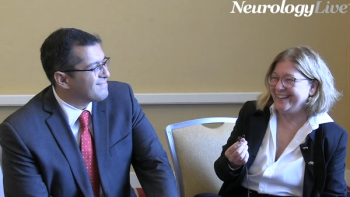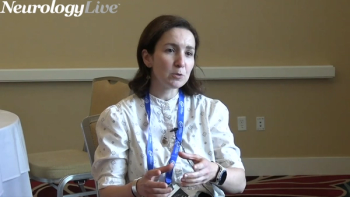
Allison W. Willis, MD, MS, associate professor of neurology at the University of Pennsylvania School of Medicine, provided an overview of hot topics from the ANA 2025 program.

Allison W. Willis, MD, MS, associate professor of neurology at the University of Pennsylvania School of Medicine, provided an overview of hot topics from the ANA 2025 program.

A groundbreaking study reveals the connection between GLP-1 hormones and brain inflammation in neuromyelitis optica spectrum disorder, suggesting new treatment avenues.

Erik Musiek, MD, PhD, a professor of neurology at Washington University in St. Louis, provided clinical insight on a presentation from ANA 2024 highlighting the intricate relationship between circadian rhythms, glial activation, and neuroinflammation in Alzheimer disease.

Michelle Bravo, MD, an assistant professor of clinical neurology at the University of Miami, provided commentary on a rare case report of a subdural hematoma linked to spontaneous intracranial hypotension caused by a refractory CSF leak.

A pair of neurologists from the University of California, Irvine, detailed some of the training and career focuses of large federal agencies in effort to address the shortage of neurologists. [WATCH TIME: 4 minutes]

The principal investigator at Seattle Children’s Research Institute described some of the ongoing questions that remain with developing therapeutics that target mTOR signaling pathway in pediatric epilepsy conditions. [WATCH TIME: 3 minutes]

The principal investigator at Seattle Children’s Research Institute provided commentary on the therapeutic potential and hypothesis behind targeting mTOR pathway hyperactivation using pharmacological inhibitors. [WATCH TIME: 3 minutes]

A pair of neurologists from the University of California, Irvine, provided commentary on the ways to help young investigators find their footing in research settings, and exposing them to opportunities major governmental agencies can provide. [WATCH TIME: 4 minutes]

The chief of the Movement Disorders Division at Mass General Hospital discussed the challenges medical students face in pathing their career and the importance of a strong mentor figure. [WATCH TIME: 6 minutes]

The chief of the Movement Disorders Division at Mass General Hospital provided context on the goals behind the research careers reimagined course at the recently concluded ANA Annual Meeting.

The associate professor at Washington University School of Medicine provided commentary on the state of care for pediatric stroke, and the challenges with identifying the most likely etiology. [WATCH 3 minutes]

The associate professor in the department of neurology at the University of Rochester provided insight on her presentation on psychosis in Parkinson disease and related disorders given at the 2023 ANA Annual Meeting.

The associate professor at Washington University School of Medicine discussed the reasons for why some institutions have different risk benefit analyses for thrombolysis, and whether this causes challenges for the healthcare system. [WATCH TIME: 4 minutes]

Patients who have 1 of 4 recently identified genetic variants are at 10 times the risk of developing progressive multifocal leukoencephalopathy depending on specific treatments for their condition.

The president of the ANA and the chair of the annual meeting programming committee provided commentary on the advances in neurology and the shift in how clinicians approach and treat diseases once thought to be fatal. [WATCH TIME: 6 minutes]

The president of the ANA and the chair of the annual meeting programming committee gave an overview on the various topics and courses the clinical community should home in on at the upcoming annual meeting. [WATCH TIME: 6 minutes]

The president of the ANA and the chair of the annual meeting programming committee provided perspective on the upcoming ANA Annual Meeting and what clinicians may get out of the meeting. [WATCH TIME: 7 minutes]

The chief scientific officer at Alzheon discussed new, positive 12-month findings on ALZ-801, an investigational agent in development for patients with early-stage Alzheimer disease.

In a subgroup of individuals with Huntington disease with high baseline C4a/C4 levels, treatment with ANX005 resulted in significant improvement in composite Unified Huntington’s Disease Rating Scale across all timepoints.

Liu discussed this work and the findings of this proof-of-principle trial in memory in epilepsy.

Albertson discussed this facet of stroke care, and all the things being done outside just the clinic to help improve outcomes.

The Anne Parrish Titzell Professor of Neurology and Neuroscience at Weill Cornell Medicine’s Feil Family Brain and Mind Research Institute spoke about the cost the condition has for patients and their families.

The professor of neurology at Virginia Commonwealth University discussed all the progress that’s been made in the space and shared her thoughts on the advances.

Cognitive complaints remain a major issue for patients with epilepsy, leading the epileptologist at the University of Pennsylvania to share her insight into addressing them.

The Global Medical Lead for Migraine and Headache at Teva Pharmaceuticals provided insight into how fremanezumab has helped to improve these facets of the condition.

The epileptologist discussed this challenge, and shared her thoughts on how to maintain this communication.

The associate professor of neurology and neuroscience at Weill Cornell Medicine discussed this work, and what she and her colleagues believe could be addressed by a successful effort.

The study found that there has been a significant increasing trend in patients with migraine—irrespective of aura status—having an ischemic stroke.

Despite some mistrusting the abilities of imaging to aid in therapeutic development, a new MRI method could better inform the anatomical understanding of the striatum.

The current president of the American Neurological Association specifically mentioned the work some groups are doing with small molecule imaging methods to help with this issue.